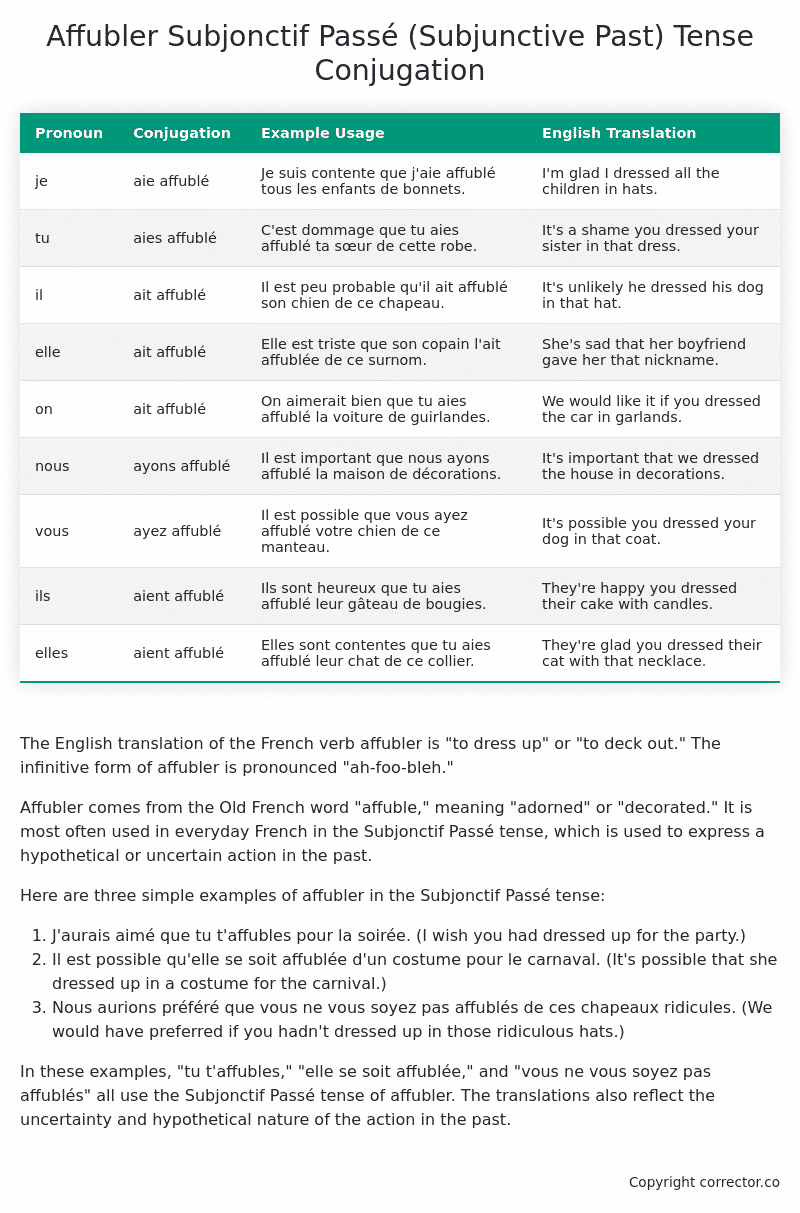Subjonctif Passé (Subjunctive Past) Tense Conjugation of the French Verb affubler
Introduction to the verb affubler
The English translation of the French verb affubler is “to dress up” or “to deck out.” The infinitive form of affubler is pronounced “ah-foo-bleh.”
Affubler comes from the Old French word “affuble,” meaning “adorned” or “decorated.” It is most often used in everyday French in the Subjonctif Passé tense, which is used to express a hypothetical or uncertain action in the past.
Here are three simple examples of affubler in the Subjonctif Passé tense:
- J’aurais aimé que tu t’affubles pour la soirée. (I wish you had dressed up for the party.)
- Il est possible qu’elle se soit affublée d’un costume pour le carnaval. (It’s possible that she dressed up in a costume for the carnival.)
- Nous aurions préféré que vous ne vous soyez pas affublés de ces chapeaux ridicules. (We would have preferred if you hadn’t dressed up in those ridiculous hats.)
In these examples, “tu t’affubles,” “elle se soit affublée,” and “vous ne vous soyez pas affublés” all use the Subjonctif Passé tense of affubler. The translations also reflect the uncertainty and hypothetical nature of the action in the past.
Table of the Subjonctif Passé (Subjunctive Past) Tense Conjugation of affubler
| Pronoun | Conjugation | Example Usage | English Translation |
|---|---|---|---|
| je | aie affublé | Je suis contente que j’aie affublé tous les enfants de bonnets. | I’m glad I dressed all the children in hats. |
| tu | aies affublé | C’est dommage que tu aies affublé ta sœur de cette robe. | It’s a shame you dressed your sister in that dress. |
| il | ait affublé | Il est peu probable qu’il ait affublé son chien de ce chapeau. | It’s unlikely he dressed his dog in that hat. |
| elle | ait affublé | Elle est triste que son copain l’ait affublée de ce surnom. | She’s sad that her boyfriend gave her that nickname. |
| on | ait affublé | On aimerait bien que tu aies affublé la voiture de guirlandes. | We would like it if you dressed the car in garlands. |
| nous | ayons affublé | Il est important que nous ayons affublé la maison de décorations. | It’s important that we dressed the house in decorations. |
| vous | ayez affublé | Il est possible que vous ayez affublé votre chien de ce manteau. | It’s possible you dressed your dog in that coat. |
| ils | aient affublé | Ils sont heureux que tu aies affublé leur gâteau de bougies. | They’re happy you dressed their cake with candles. |
| elles | aient affublé | Elles sont contentes que tu aies affublé leur chat de ce collier. | They’re glad you dressed their cat with that necklace. |
Other Conjugations for Affubler.
Le Present (Present Tense) Conjugation of the French Verb affubler
Imparfait (Imperfect) Tense Conjugation of the French Verb affubler
Passé Simple (Simple Past) Tense Conjugation of the French Verb affubler
Passé Composé (Present Perfect) Tense Conjugation of the French Verb affubler
Futur Simple (Simple Future) Tense Conjugation of the French Verb affubler
Futur Proche (Near Future) Tense Conjugation of the French Verb affubler
Plus-que-parfait (Pluperfect) Tense Conjugation of the French Verb affubler
Passé Antérieur (Past Anterior) Tense Conjugation of the French Verb affubler
Futur Antérieur (Future Anterior) Tense Conjugation of the French Verb affubler
Subjonctif Présent (Subjunctive Present) Tense Conjugation of the French Verb affubler
Subjonctif Passé (Subjunctive Past) Tense Conjugation of the French Verb affubler (this article)
Subjonctif Imparfait (Subjunctive Imperfect) Tense Conjugation of the French Verb affubler
Subjonctif Plus-que-parfait (Subjunctive Pluperfect) Tense Conjugation of the French Verb affubler
Conditionnel Présent (Conditional Present) Tense Conjugation of the French Verb affubler
Conditionnel Passé (Conditional Past) Tense Conjugation of the French Verb affubler
L’impératif Présent (Imperative Present) Tense Conjugation of the French Verb affubler
L’infinitif Présent (Infinitive Present) Tense Conjugation of the French Verb affubler
Struggling with French verbs or the language in general? Why not use our free French Grammar Checker – no registration required!
Get a FREE Download Study Sheet of this Conjugation 🔥
Simply right click the image below, click “save image” and get your free reference for the affubler Subjonctif Passé tense conjugation!

Affubler – About the French Subjonctif Passé (Subjunctive Past) Tense
Formation of the Subjonctif Passé
Everyday Usage Patterns
Interactions with Other Tenses
Present tense
Future tense
Conditional
Summary
I hope you enjoyed this article on the verb affubler. Still in a learning mood? Check out another TOTALLY random French verb conjugation!


